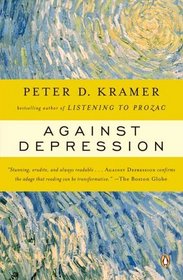Helpful Score: 1
Kramer noticed a trend while promoting his previous book: people kept asking him, "But what if Van Gogh had had Prozac?" Generally, they meant that they thought Van Gogh's depression was directly tied to his genius, and that ameliorating his condition would have killed his art. And Kramer started thinking, what a weird question. After all, we have plenty of evidence that depression makes it harder for people to get motivated to do anything, including paint masterpieces, so why don't we assume that Van Gogh was a genius in spite of, rather than because of, his depression? That led to this book.
Kramer describes many examples of the old trope that depression is linked to genius, a trope portrayed in literature and evidently believed by the many people who asked that question. He points out that in the 19th century, tuberculosis was also portrayed as a disease for sensitive, artistic types, yet now that we understand it better, no one would seriously suggest that tuberculosis contributes to artistic talent and so treating it would be a tragedy.
He moves on to discuss the latest (as of the time of writing) research on depression, which increasingly suggest an organic cause, or at least a strong organic component, for the disease. He describes how the medication interferon can induce depression, how a comparison of depressed and non-depressed cadavers revealed a greater incidence of the depressed cadavers having holes in their brains up to 2 cm in diameter, how some people have greater capability for neuroresilience (essentially, the brain's ability to grow back neurons damaged by stress or chemical causes or whatever), and many other clinical findings. Kramer suggests that depression is like heart disease: lifestyle can contribute to it, but you might have a genetic predisposition too - perhaps people with naturally high neuroresilience are the ones who seem to bounce back from crises, while those with low neuroresilience can't, in the same way that some people will get high blood pressure almost regardless of what they do.
I highly recommend this book.
Kramer describes many examples of the old trope that depression is linked to genius, a trope portrayed in literature and evidently believed by the many people who asked that question. He points out that in the 19th century, tuberculosis was also portrayed as a disease for sensitive, artistic types, yet now that we understand it better, no one would seriously suggest that tuberculosis contributes to artistic talent and so treating it would be a tragedy.
He moves on to discuss the latest (as of the time of writing) research on depression, which increasingly suggest an organic cause, or at least a strong organic component, for the disease. He describes how the medication interferon can induce depression, how a comparison of depressed and non-depressed cadavers revealed a greater incidence of the depressed cadavers having holes in their brains up to 2 cm in diameter, how some people have greater capability for neuroresilience (essentially, the brain's ability to grow back neurons damaged by stress or chemical causes or whatever), and many other clinical findings. Kramer suggests that depression is like heart disease: lifestyle can contribute to it, but you might have a genetic predisposition too - perhaps people with naturally high neuroresilience are the ones who seem to bounce back from crises, while those with low neuroresilience can't, in the same way that some people will get high blood pressure almost regardless of what they do.
I highly recommend this book.




![header=[] body=[Get a free book credit right now by joining the club and listing 5 books you have and are willing to share with other members!] Help icon](/images/question.gif?v=5fea88b8)
